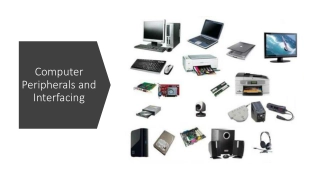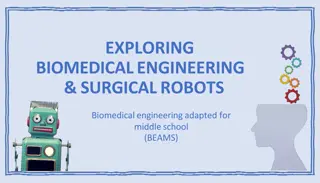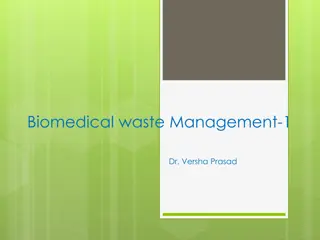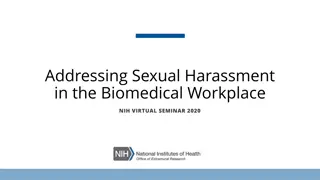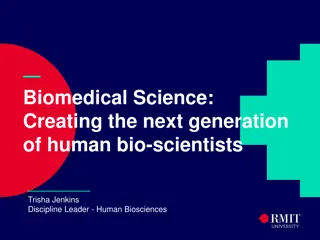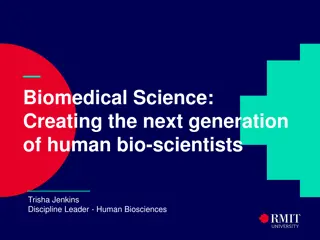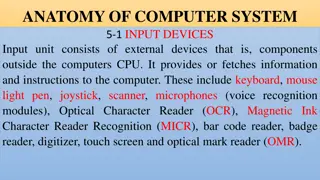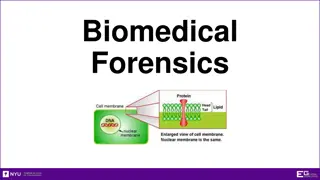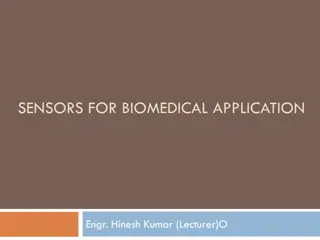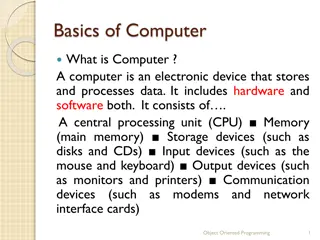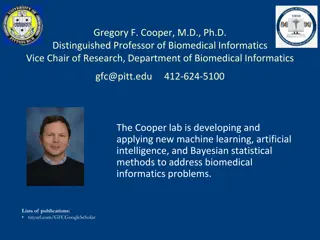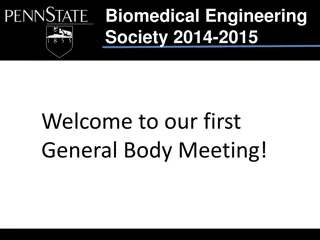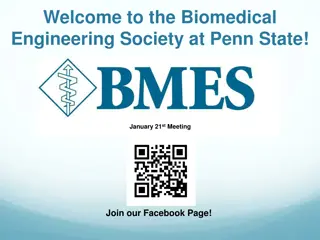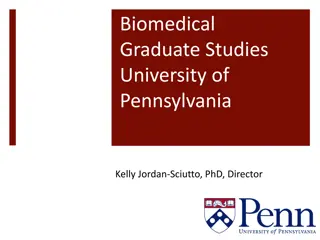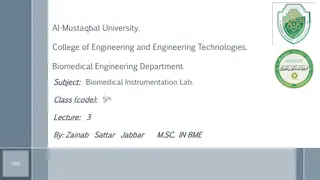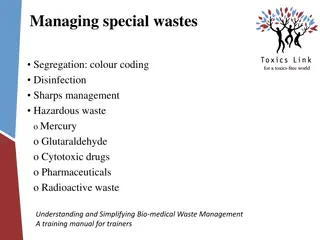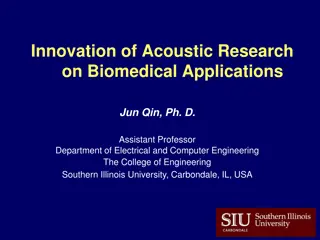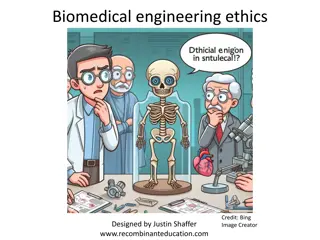Computer Peripherals and Interfacing
Computer peripherals are external devices that enhance the functionality of a computer. They include input devices like keyboards and mice, output devices like printers and monitors, and storage devices like hard disk drives and solid-state drives. Interfacing circuits connect these peripherals to t
1 views • 6 slides
Collaborative Partnerships in Biomedical Research: ABRC Workshop Overview
The Arizona Biomedical Research Centre (ABRC) focuses on translational research and collaborative partnerships to improve healthcare in Arizona. Established in 1984, ABRC receives funding from sources like the Arizona lottery and tobacco tax. Their staff includes dedicated professionals like the Exe
0 views • 11 slides
Opportunities for Graduate Student Fellowships and Awards in the Biomedical Sciences Field
Explore various prestigious fellowship and award opportunities for graduate students in the biomedical sciences field, including the NIH Ruth L. Kirschstein Predoctoral Award, Foundation for Physical Therapy Research PODS I & PODS II Awards, NSF Graduate Student Research Fellowship, and more. These
1 views • 8 slides
Understanding Network Devices and Connectivity
Network devices play a crucial role in connecting computers and printers to networks, facilitating fast and secure data transfer. These devices, such as network interface cards and WiFi cards, help devices communicate effectively on the same or different networks. MAC addresses uniquely identify dev
6 views • 31 slides
Exploring Biomedical Engineering & Surgical Robots
Biomedical engineering is about designing solutions for health and medicine. Engineers identify problems, plan solutions, create prototypes like surgical robots, and continuously test and improve them. Through hands-on activities like building Da Vinci Robot replicas, students can learn the engineer
2 views • 12 slides
Effective Biomedical Waste Management: Ensuring Public Health and Environmental Safety
Proper management of biomedical waste is crucial to prevent serious public health risks and environmental impacts. The World Health Organization estimates significant infections from contaminated syringes, highlighting the urgent need for efficient segregation and disposal practices. Categorized was
0 views • 15 slides
Understanding Input and Output Devices in Computing
In computing, input and output devices play a crucial role in enabling communication between users and computers. Input devices are used to enter data into a computer, while output devices display or provide the results of processed information. Common input devices include keyboards, mice, and joys
0 views • 17 slides
Advancing Biomedical Prevention Products: PMM Country Landscaping Analysis
PMM is progressing on planning for introducing CAB-LA for biomedical prevention, aiming to address challenges with oral PrEP and accelerate impact. The report discusses findings, recommendations, and next steps for Malawi and Zimbabwe, emphasizing the importance of intentional coordination, regulato
0 views • 26 slides
Overview of Laboratory Animals and Their Uses in Biomedical Research
Laboratory animals play a crucial role in biomedical research, serving as models for studying various conditions affecting humans and animals. They must thrive in controlled conditions and are used to test hypotheses and drugs. Commonly used lab animals include rodents, lagomorphs, canines, felines,
0 views • 9 slides
Automotive Grade 10 Joining Methods: Locking Devices Overview
Automotive Grade 10 explores joining methods using locking devices to prevent nuts from loosening due to movement and vibration. Friction-locking devices include lock nuts, stiff nuts, and special washers. Positive-locking devices tighten nuts securely with slotted nuts, crowned nuts, tab washers, a
1 views • 7 slides
Addressing Sexual Harassment in the Biomedical Workplace: NIH Seminar Overview
Explore how the NIH handles allegations of sexual harassment in the biomedical workplace through policies, procedures, and support for a safe work environment. Learn about panelists and NIH guidelines for addressing and reporting incidents. Find out the impact on research awards and the process for
2 views • 9 slides
Exploring Biomedical Science: Shaping Future Human Bio-Scientists
Biomedical science plays a pivotal role in understanding human body functions, addressing malfunctions, and improving health outcomes. Students in disciplines like Human Biosciences, Laboratory Medicine, and Pharmaceutical Sciences engage in a variety of subjects such as Biochemistry, Physiology, an
0 views • 7 slides
Exploring Biomedical Sciences: Shaping Future Bio-Scientists
Biomedical Science plays a crucial role in understanding the human body, its functions, and ailments. Through courses like BP231, BP147, and BP311/BH121, students delve into biochemistry, physiology, and pharmaceutical sciences. They are equipped for roles in research, medical practice, and pharmace
4 views • 7 slides
Pursuing Excellence With Passion in Biomedical Product Management
Canadian management experienced in high-value customer service and complex project management leads the way in the Middle East's biomedical product distribution. The company excels in distributor selection, market penetration, and training to ensure top-quality technology reaches those in need. Nota
0 views • 14 slides
Critical Appraisal Institute for Librarians (CAIFL) Overview and Objectives
CAIFL is a program designed to enhance librarian skills in critical appraisal, research design, biomedical statistics, and clinical reasoning. The goal is to improve the ability to teach these concepts to target populations. The program includes plenary sessions, educational presentations, journal c
0 views • 20 slides
Biomedical Science Pathway at Grand Prairie Collegiate Institute
PLTW's Biomedical Science pathway at Grand Prairie Collegiate Institute offers high-level education in biomedical sciences, preparing students with real-world challenges and hands-on experiences to excel in medical-related fields. Students gain essential knowledge and skills, including certification
1 views • 5 slides
Overview of Computer Input and Output Devices
Input devices of a computer system consist of external components like keyboard, mouse, light pen, joystick, scanner, microphone, and more, that provide information and instructions to the computer. On the other hand, output devices transfer information from the computer's CPU to the user through de
0 views • 11 slides
Biomedical Forensics: Solving Mysteries Through DNA Analysis
Explore the world of biomedical forensics with a focus on DNA extraction, blood typing, and fingerprinting techniques. Unravel murder mysteries using basic forensic skills and investigative procedures. Learn about the properties of DNA, forensic techniques like blood typing and fingerprinting, and t
0 views • 14 slides
Understanding Sensors in Biomedical Applications
Explore the world of sensors in biomedical applications with insights on transducers, active vs. passive sensors, common sensor types, error sources, and examples of sensors used in medical instruments. Learn about the functions and distinctions between sensors, transducers, and actuators, along wit
3 views • 64 slides
Understanding Basics of Computer Systems
A computer is an electronic device that stores and processes data using hardware and software components. It consists of a CPU, memory, storage devices, input/output devices, and communication devices. The CPU includes a Control Unit and Arithmetic Logic Unit, and the memory stores data in bytes. St
0 views • 57 slides
Quality Management in Biomedical Equipment Development
The content discusses key concepts and elements of quality management in the industry-academic cooperation for biomedical equipment development. It emphasizes the importance of planning, process approach, organization, resources, and improvement through corrective and preventive actions. The content
0 views • 16 slides
Innovative Biomedical Informatics Research by Dr. Gregory F. Cooper
Dr. Gregory F. Cooper, a distinguished professor of Biomedical Informatics, leads cutting-edge research in applying machine learning, artificial intelligence, and Bayesian statistical methods to solve biomedical informatics challenges. His work includes individualized prediction of treatment effects
0 views • 8 slides
Security Concerns and Future Challenges of Internet Connected Devices in Budva, Montenegro
With the increasing number of Internet-connected devices and IoT, the security concerns are escalating. In the past, communication was restricted to servers and terminals, but now everyone is connected globally. The future poses even greater risks with IoT becoming prevalent. Reasons for concern inc
0 views • 17 slides
Applications of RC Circuits in Electronics and Biomedical Devices
RC circuits play a crucial role in various applications such as camera flashes, timing devices in automobiles, and heart pacemakers. These circuits involve charging and discharging a capacitor through a resistor, controlling voltage pulses for precise timing. In devices like camera flashes, the flas
0 views • 7 slides
Biomedical Engineering Society 2014-2015 General Body Meeting Highlights
Welcome to the first General Body Meeting of the Biomedical Engineering Society 2014-2015. This meeting covers topics such as membership dues, points system, freshman chair positions, networking executive board plans, contact information for department heads, and industry company interactions. Addit
0 views • 14 slides
Reimagining Evaluation in Biomedical Sciences
Large numbers of PhDs in biomedical sciences face uncertainty in career prospects post-graduation. Many aspire to tenure-track jobs but few actually secure them. The prevalent use of bibliometrics heavily influences career pathways. Paula Stephan's research highlights the need to rethink evaluation
0 views • 28 slides
Walt Whitman High School Biomedical Science Program Overview
The Foundations of Biomedical Science Program at Walt Whitman High School provides students with a strong academic foundation and practical experiences in preparation for careers in medicine and biomedical sciences. Open to students in grades 9-12, the program includes core academic classes, advance
0 views • 20 slides
Biomedical Engineering Society at Penn State - Upcoming Events and Opportunities
Join the Biomedical Engineering Society at Penn State for networking sessions, career fair preparation, internship/job opportunities, and more. Don't miss out on events like BMES Networking with Kimberly-Clark, THON fundraiser, and Engineering Career Fair featuring top companies hiring biomedical en
0 views • 11 slides
Wireless Office Docking Model for Multiple Devices
This document outlines a usage model for office docking involving wireless connections between mobile devices and various peripheral devices such as monitors, hard drives, printers, and more. It describes scenarios for single and multiple devices in both home and office settings, emphasizing the nee
0 views • 5 slides
Understanding I/O Systems and Devices
I/O systems and devices play a crucial role in computer operations. They can be categorized into block devices and character devices based on their functionalities. Block devices store information in fixed-size blocks with addresses, while character devices handle character streams. Some devices, li
0 views • 19 slides
Gait Device Selection for Children with Lumbar Level Myelomeningocele
This presentation discusses the considerations and choices of gait devices for children with lumbar level myelomeningocele. It covers the specific needs of pediatric patients, benefits and drawbacks of various devices, funding requirements, and clinical application through case studies. The material
0 views • 31 slides
Biomedical Graduate Studies at University of Pennsylvania
Biomedical Graduate Studies (BGS) at the University of Pennsylvania offers a diverse range of graduate groups and programs in various fields of study such as Biochemistry, Cell Biology, Immunology, and more. With a large number of students and faculty, BGS provides opportunities for research and aca
0 views • 8 slides
Understanding FAIR Principles in Biomedical Research
The FAIR principles - Findable, Accessible, Interoperable, and Reusable - provide a framework for ensuring scientific data in biomedical research is managed and shared effectively. This informative session delves into the theory and practice of FAIR principles, emphasizing the importance of data qua
0 views • 28 slides
Understanding Ultrasound in Biomedical Instrumentation Lab
Ultrasound machines are key tools in biomedical engineering, utilizing sound waves to create images of internal body structures without invasive procedures. This technology finds applications in various medical fields, such as gynaecology, cardiology, neurology, and nephrology. While offering real-t
0 views • 21 slides
Combination HIV Prevention Strategies and Interventions
Explore the comprehensive approach to HIV prevention through a combination of biomedical, behavioral, and structural interventions. Learn about the goals of prevention, the ecological model, and the various strategies such as biomedical interventions and behavioral interventions. Discover how these
0 views • 16 slides
Effective Biomedical Waste Management Strategies
Proper management of biomedical waste is crucial for infection control, hazard reduction, cost savings, and legal compliance. Segregation, color coding, disinfection, and proper treatment methods are essential for handling different types of hazardous waste efficiently. Understanding these processes
0 views • 27 slides
Acoustic Research Innovations in Biomedical Applications
Acoustic research in biomedical applications led by Dr. Jun Qin focuses on areas such as therapeutic ultrasound for kidney stone treatment and gene activation, as well as audible sound research on hearing loss and tinnitus. The projects involve comparison of electrohydraulic and electromagnetic shoc
0 views • 27 slides
Importance of Ethics in Biomedical Engineering Decision Making
Biomedical engineering ethics play a crucial role in decision-making processes within the field, influencing product design and treatment development. This article explores the significance of ethical considerations in biomedical engineering, evaluating ethical dilemmas, stakeholders to be considere
0 views • 14 slides
Exploring New Topics in Biomedical Engineering
Delve into the latest advancements and research areas in the field of Biomedical Engineering through engaging presentations and discussions. Discover new themes and topics, stay updated on current agendas, and learn about innovative projects and initiatives at the School of Biomedical Engineering.
0 views • 12 slides
Combatting Counterfeit and Substandard ICT Devices: IMEI Ecosystem & Its Role
The conference held in Geneva, Switzerland in November 2014 addressed the critical issue of combatting counterfeit and substandard ICT devices, focusing on the IMEI ecosystem and its significance in preventing the use of counterfeit devices. James Moran, Security Director at GSM Association, highlig
0 views • 12 slides
